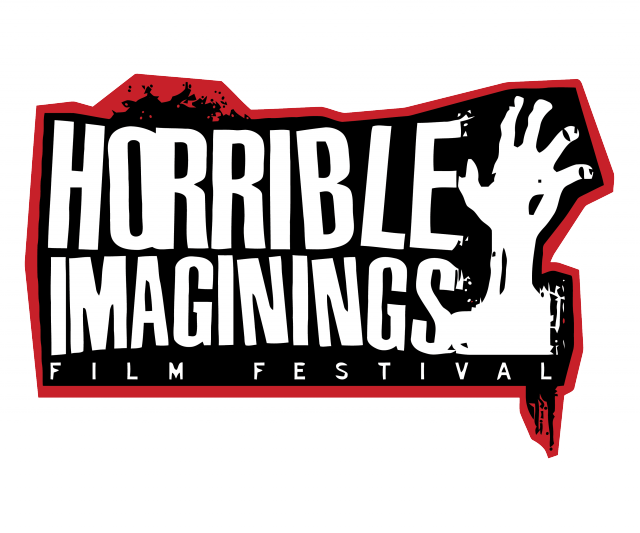Horrible Imaginings 2021: A Reflection and A Thank You!
It is Saturday, September 11, and perhaps it is a testament to my tunnel vision that, while so many people seem to be reflecting on the two decades that have transpired since the attacks on September 11, 2011, my brain is still intent on trying to reflect on our 12th annual event, which was still in the thick of things one week ago. Perhaps it is inadvisable to start this reflection in this way, but I have always been fairly transparent with my darkest thoughts and I do think it is illustrative of the all-consuming nature of festival organization.
Honestly, I’ve been trying to sit down and write this for the last five straight days, only to stare at that godforsaken blinking cursor on my computer screen. Instead of composing this at home, I am now dictating it, speech to text, to my phone while I wait for the next film to start at The 21st annual film out San Diego film festival, which is happening right this second at our own former venue of the Museum of photographic arts in Balboa Park. Funny how this particular setting has made me able to think in a clear eyed manner about last week.
Let’s start at the beginning.
In June, we held a 24 hour marathon because we knew we were doing a hybrid festival this year. This entire endeavor was experimental, but we knew one thing for sure: it would be double the work, double the budget, double the stress, and double the energy. Although we did not reach our Quixotic goal that weekend, We did make enough that I could compensate my team, which was of the utmost importance to me.
Which brings me to the next bit of foundational information here. Our programming team of 11 people has been going strong with the same brilliant minds since 2019, but the core operations team has always been a bit harder to keep organized and static. This is largely due to my own failings as a manager who delegates responsibility well. Right around the time of that June fundraiser, we solidified an organizational chart of official core operations with some legacy team members getting promoted and some wonderful new folks joining the cadre.
Now, forming a newly minted team just two months before the start of our festival was not without significant growing pains. I am pleased to announce that everyone settled into their roles in record time, leading to one of the smoothest running festivals in our twelve year history.
And how did that affect the festival last week? Well, it takes place in a town where the hospitalization rate is spiking dramatically and the local government is not too quick to act. We had to act instead as an organization, along with our partners the Frida Cinema, to decide how to execute this event in a safe way. That meant dropping Cinema capacity to 38%, honoring requests from both filmmakers and audience members to opt for virtual participation after thinking they would be taking part in person, lots of wipe downs and sanitizers, and—of course—requiring masks inside the building.
So much gratitude goes to the entire ecosystem of our community: Cinema, volunteers, press, audience, filmmakers, panelists, and our own team for doing their part to make this run smoothly and safely and with very few glaring technical difficulties. As I look on the backend, I see people are still tuning in to watch the Q&A’s and panels that were live streamed. There is a lot we are still learning about how to best serve our community and our artists, but I am fairly certain we will continue going forward with some hybrid model in the future. It was such a treat to be able to have audiences hear from filmmakers all over the world, whether they were on stage in person or projected on the screen via zoom. We owe much to the Frida staff for making this capability possible.
As many reading this will attest, the most glaring technical problem was that the awards ceremony live broadcast failed right at the tail end of the festival. I want to apologize to those of you who tuned in and were waiting for a broadcast that never appeared. While that was both embarrassing and frustrating for all involved, I must admit that the greatest fraction of my feelings comprise relief that it was the only thing that failed to broadcast. Frankly, the discussions of the films that we showed are far, far more important to me and to the mission of the festival.
Programming wise, I am very proud to reflect on how eclectic and diverse our artist representation continues to be. The source of this mission is to explore the fears and anxieties from a variety of perspectives and experiences, and having diverse filmmakers is simply critical to that mission. Our fears are tied part and parcel to our personal experiences, and Horror in particular benefits from multiple sides to every story. Once again, I have our programmers to thank for such thoughtful selections, and I hope they are ready to start again in one month’s time!
I’ve talked about our team and our programmers, so I will name them here in alphabetical order:
For core operations, we have our Director of programming and filmmaker outreach Sterling Anno. It was Sterling who not only served as a programmer, but helped organize the program booklet, communicate with filmmakers, gather materials needed for screening, and worked with the cinema to ensure the best experience possible. Special thanks also to his monster volunteer Jacob Angelo!
Jon Condit handles our virtual presence, as well as our web presence. He organized our discord channel and made sure the live streams and links were working over the course of the entire weekend. Jon also worked as a programmer.
Lauren Cupp is our Director of marketing and worked tirelessly to keep the public informed not only about our festival, but about the titles we selected. She had to hit the ground running, basically reinventing our social media strategy and analyzing the results. What a champ! Her monster volunteer Sara Olson created some truly stunning images from film posters or stills.
If you know some of these names already, then you have Jay Kay to thank. He is our Director of press and media outreach, and one thing he did was work with various outlets to organize interviews with staff members besides myself. Personally, it was a joy to hear an interview about horrible Imaginings that was given by one of our team, and not by me. He also worked very hard to compose press releases about our offerings and personalized outreach to a variety of media outlets. Jay also worked as a programmer.
Rabia Sitabi is our project director. Any organizational success behind the scenes, including people keeping people on task, organizing a timeline of needs, and defining workflows, comes whole cloth from Rabia. Personally, Rabia was a huge reason I made it out of this in a balanced psychological state. And she did this nine hours into the future every day because she lives in the Netherlands! She also worked as a programmer.
Laura Vasquez has been involved with the festival for years, but took on two very important roles starting this year: first as Director of HR, and second as Director of Production. In the first role she helped organize volunteers and ensure a proper code of conduct, as well as contribute to our values statement. In the second role, which likely was far more taxing, she organized any food, parties, and other on-promises activities that were planned for the festival.
Sterling, Jay, and Lauren
At the 11th hour we hired LJ Jackson as a Director of sponsorship and partnership outreach. She has created a sponsorship deck for next year, and will help ensure a more spectacular future for our festival. If there is one major thing to reflect on that is both depressing and a little inspiring it is that we managed two years in a row with zero financial sponsorship. For full transparency, ticket and past sales plus money from film submissions covers a total of around 60-70% of our operations budget. The rest requires gifts, donations, sponsorships, and grants. To have survived two years in a row without this was difficult, But I am proud to say we still stand. That said, it is definitely not sustainable and you will be seeing another fundraiser soon!
Financially, the virtual component did rescue our festival from languishing deep into the red. Our sincere gratitude goes out to all participants and audience members, whether you saw us in person or through the veneer of a computer screen. We definitely cannot do this without you. So buckle in folks, because I am about to unleash a metric fuckload of gratitude.
We also can’t do this without the filmmakers who provide that 50% of the conversations we have in the form of their art. Thank you to all of you for submitting your work, having the bravery to display it on a huge screen, and being present for our questions. A very special thanks goes out to the professionals who devoted time to enlighten us via our panels. Neuroscientist Eric Leonardis fielded a brilliant Discussion on Transhumanism with Naeri Do, director of TRANS. And he had to do that while talking to a big screen over zoom and through the intermediary of a language translator. It was fascinating and brilliant and could’ve been very easily derailed, but it was more than I was hoping it would be! Editor and filmmaker Andrew Kasch, who had no work in our festival this year, took time out of his insane schedule on set directing in Vancouver To join two of our filmmakers in a panel on filmmaking during the pandemic. His contribution added exactly the layers and elements I was hoping it would.
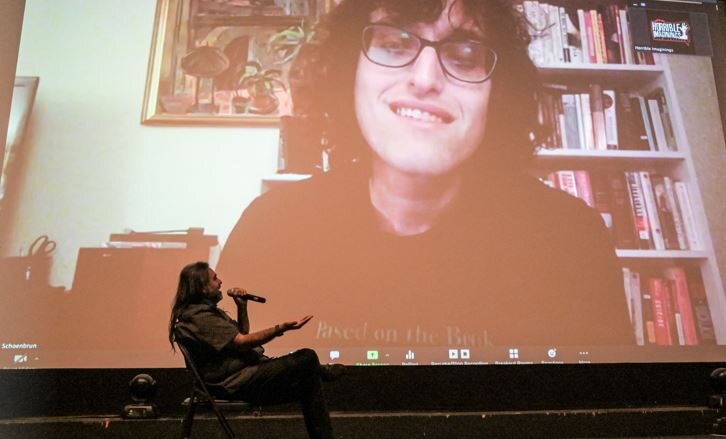
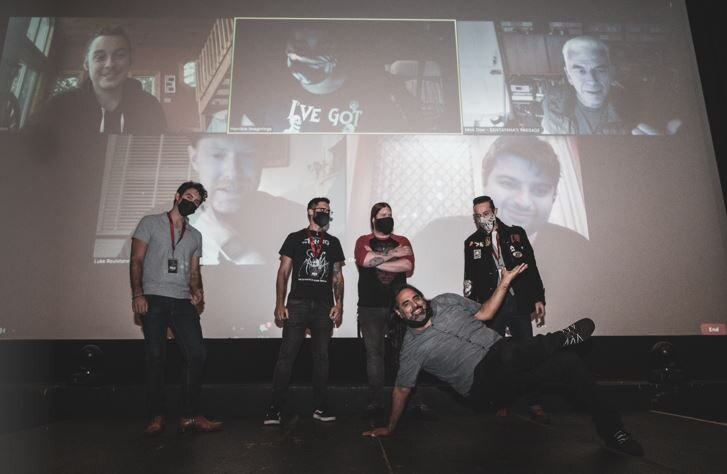
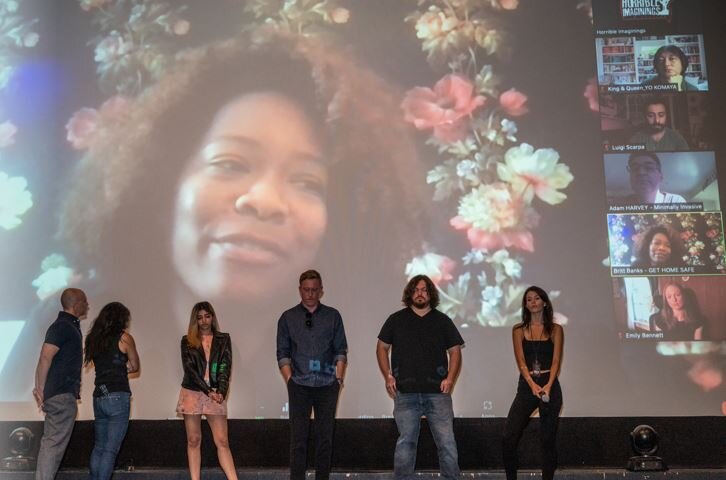
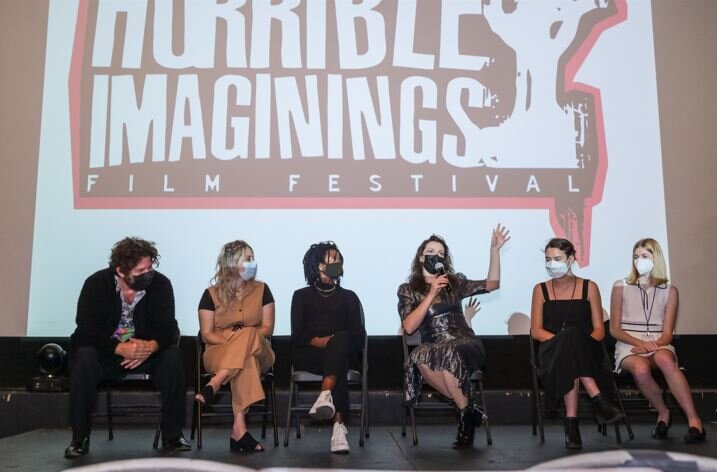
The rest of our programming team worked tirelessly over an extremely difficult year to distill our submissions down to one exemplary program. My absolute gratitude and awe go out to Laila Ayad, James C. Coker, Rebekah Fieschi, Synthia Hogan, Ashlea Wessel, and Macon Wilson for all of the hours of thoughtful scrutiny they put into their jobs.
The job that I least envy is that of the awards judge. For the difficult task of selecting favorites, I offer sincere gratitude to film critic Beth Accomando, who also supplied some absolutely fabulous brain cookies for our REEL Science Panel, composer Andrew Scott Bell, filmmaker and scholar Shayna Connelly, and screenwriter Kirsten Elms. Our judges are all professionals with extremely busy schedules, so their hard work is noted and appreciated. It should also be noted that they had about a month to watch everything with judgment in mind. Not an easy task.
Everyone’s hard work in this ecosystem needs rigorous documentation. It should not only be informative, but it should look goddamn good! For supplying both qualifications, I offer my thank you to Srini Rajan, Vanessa, and of Urbanite Media for stellar photography!
We also owe much to our on-the-ground volunteers Percy Presswalla, Percy Presswalla, Christine Schindel, Bryan Vermeer, Allan Dizon, Sara Kalhor, Hilary Lange, and Mike Zhou. Extra special thanks goes to the wonderful Leonardo Ostergren for always going above and beyond to ensure the best event possible for just about everyone involved. Leo is the kind of person you dream about being part of your team!
The manager of the Frida Trevor Dillon worked his ass off to ensure the sound and picture quality of almost 100 titles over a four day period. He also helped us schedule out and plan for a very rigid timeframe of events that included ensuring we were broadcasting live when we told virtual audiences we were going to be. Y’all, this shit was hard! Major thanks also to Isa Bulnes-Shaw and Garrett Cruz for managing the floor and the projection booth. I know it wasn’t easy, but you made it seem so! Every person who worked at The Frida during our festival was badass and I love them! Sydney Dayan helped wrangle volunteers, Owen Ela helped use the powerful Frida Cinema socials to spotlight our films, and Martin Nguyen continues to kicks as on all kinds of operations, both technical and logistical.
Logan Crow, you are the head of one of the most cherished buildings in Southern California for me. The Frida Cinema is not just a movie theater. It is a church. It is a therapist's office. It is a family home. It is our home. Thank you for your dedication to this art form and the continued proper exhibition of it. Your work is not unseen.
I know that was a lot of acknowledgments to read, but each one is deserving of all of our time! Stay tuned to our social media channels and our Vimeo channel in the coming weeks as we add supplemental interviews and conversations with our filmmakers! And don’t forget that the first Campfire Tales of the season takes place on the weekend of October 3rd—virtually starting September 30th and in-person at The Frida Cinema starting at 5:30pm with live discussions with the filmmakers! Feel free to reach out with any questions and let’s enjoy the best season of the year!
